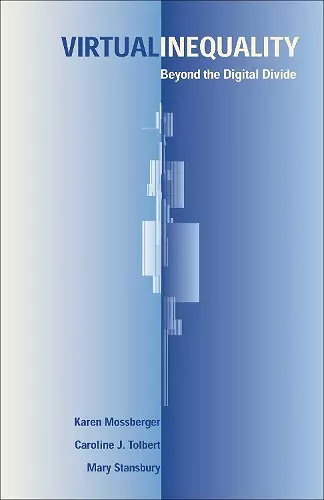Virtual Inequality
Beyond the Digital Divide
Karen Mossberger author Caroline J Tolbert author Mary Stansbury author
Format:Paperback
Publisher:Georgetown University Press
Published:18th Aug '03
Currently unavailable, and unfortunately no date known when it will be back

While government is digitally transforming the way in which it delivers services and communicates with citizens, this book reminds us that many are not likely to benefit from greater access to services, information, and government officials. The authors reconceptualize the information technology challenge facing society as a constellation of multiple divides involving access, skill, economic opportunity, and democratic political participation. Moreover, they draw on both a wealth of important data and rigorous analysis to demonstrate convincingly that persistent disparities in technology access and skill matter for economic opportunity and political participation, and that governments will have to fashion broader solutions to take full advantage of technology's social potential. -- Jane E. Fountain, associate professor of public policy and director of the National Center for Digital Government, John F. Kennedy School of Government, Harvard University Who should read Virtual Inequality? Students, teachers, journalists, policy analysts, government decision makers, community leaders and especially ordinary citizens should read it. The authors provide a concise and clear beacon for seeing and understanding the so-called digital divide not simply as a measurement of the gaps between those who have ready access to PCs and Internet connectivity and those who don't. Instead, they present and explain a much bigger, more complex, critical set of problems and issues regarding how the allocation of information and knowledge, political power and opportunity is defining the evolving Information Society of the 21st Century. They caution that beyond the term digital divide are issues about quality of life, democracy, exclusion and who gets what, when and under what circumstances. -- Nolan A. Bowie, senior fellow and adjunct lecturer in public policy, Harvard University Learning how to understand the impact of the Internet on civic life is one of the most important challenges facing us today. This book presents new insights and new data on virtual inequality and the digital divide. Anyone interested in how technology is reshaping democracy should read this book. -- Darrell West, professor of political science and public policy and director of the Taubman Center for Public Policy at Brown University Statistically rigorous and eminently readable, Mossberger, Tolbert and Stansbury have delivered a valuable, accessible contribution to digital divide literature. Virtual Inequality is chock full of insightful data, analysis and recommendations for policy makers. -- Amanda B. Lenhart, research specialist, Pew Internet & American Life Project
That there is a 'digital divide' - which falls between those who have and can afford the latest in technological tools and those who have neither in our society - is indisputable. This title redefines the issue as it explores the cascades of that divide, which involve access, skill, political participation, as well as the obvious economics.That there is a "digital divide" - which falls between those who have and can afford the latest in technological tools and those who have neither in our society - is indisputable. "Virtual Inequality" redefines the issue as it explores the cascades of that divide, which involve access, skill, political participation, as well as the obvious economics. Computer and Internet access are insufficient without the skill to use the technology, and economic opportunity and political participation provide primary justification for realizing that this inequality is a public problem and not simply a matter of private misfortune. Defying those who say the divide is growing smaller, this volume, based on a unique national survey that includes data from over 1800 respondents in low-income communities, shows otherwise. In addition to demonstrating why disparities persist in such areas as technological abilities, the survey also shows that the digitally disadvantaged often share many of the same beliefs as their more privileged counterparts. African-Americans, for instance, are even more positive in their attitudes toward technology than whites are in many respects, contrary to conventional wisdom. The rigorous research on which the conclusions are based is presented accessibly and in an easy-to-follow manner. Not content with analysis alone, nor the untangling of the complexities of policymaking, Virtual Inequality views the digital divide compassionately in its human dimensions and recommends a set of practical and common-sense policy strategies. Inequality, even in a virtual form this book reminds us, is unacceptable and a situation that society is compelled to address.
ISBN: 9780878409990
Dimensions: unknown
Weight: 295g
208 pages